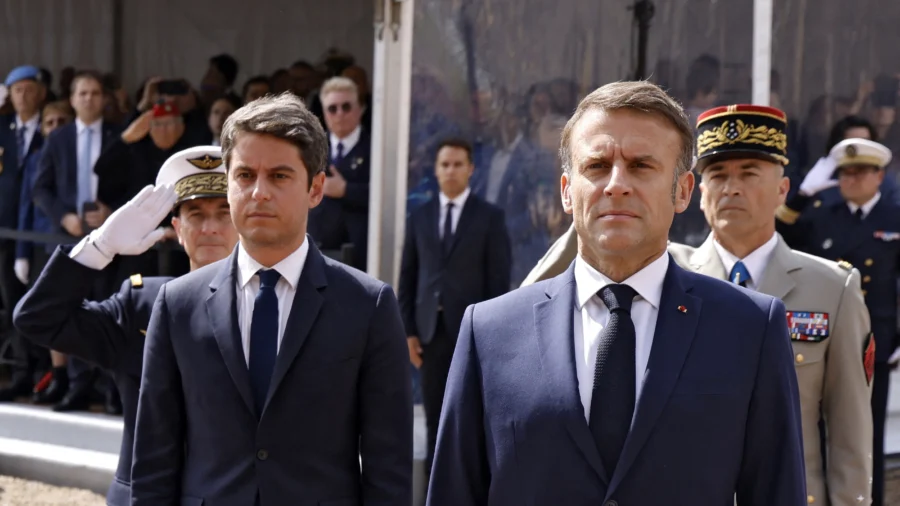French President Emmanuel Macron has refused the resignation of the country’s prime minister, asking him to remain on temporarily as the head of the government after the July 7 runoff legislative election delivered France a hung parliament.
Mr. Macron requested that Prime Minister Gabriel Attal stay in office “to ensure the stability of the country,” following a 90-minute meeting with the president’s top political allies on July 8.
Mr. Attal offered his resignation earlier in the day but said he would remain in office if needed, prompting the president’s request for him to continue in his position.
The French election was mired by disarray, as a second round of voting was triggered after the first round of elections on June 30 failed to identify enough candidates with more than 50 percent of the vote in their electorate. But after the runoff, none of the parties on the left, center, or right were close to forming a majority in the lower house, leaving no obvious path for the formation of government.
As a result, the European Union’s second-largest economy is now at risk of paralysis, just weeks ahead of the Paris Olympics, which will put the country in the international spotlight.
The results proved contrary to President Macron’s intention in calling the snap elections, which he said would result in a “moment of clarification” for the country.
Mr. Attal had earlier voiced his disagreement with the president’s decision to call the snap election.
A Hung Parliament
Newly elected and returning lawmakers are expected to gather at the National Assembly to begin negotiations to form government in earnest. President Macron is heading to Washington later this week to attend the NATO summit.
The political deadlock could impact the ongoing conflict in Ukraine, and affect global diplomacy and economic stability in the European Union.
Official results released early on July 8 show that no party or coalition came close to reaching the required 289-seat majority to control the 577-seat National Assembly, which represents the more powerful of France’s two legislative chambers.
According to the results, the New Popular Front (NFP) leftist coalition placed first with 188 seats, just ahead of President Macron center-left alliance, which came in at 161 seats. While Marine Le Pen’s conservative National Rally and its allies came in third place, and their 140 seats far exceed their results of 2022, when the party came in with 142 seats.
Coalition governments are not commonplace in France, which means lawmakers from rival political camps generally don’t come together to form a majority. The governance of France is also more centralized than in many other European countries, with more decisions being made from Paris.
President Macron has three years remaining on his presidential term, but his popularity has suffered a sharp decline as millions used their vote to express their discontent about the incumbent’s leadership approach when facing high inflation, surging crime, and its handling of immigration.
Following the results, the NFP’s leaders immediately said they wanted to run government and propose a prime minister, offering Mr. Macron an invitation to form a government with them. But they conceded that talks would be tough and take time.
The left could form a minority government, but it would be at the mercy of a no confidence vote from rivals unless they reach deals.
Among the pledges of the leftist faction are a reversal of many of Macron’s headline reforms, increasing public spending programs, in addition to adopting a more stringent approach against Israel and the ongoing war with Hamas.
As of yet, however, there exists no certainty of who could lead the government without alienating crucial allies.
“We need someone who offers consensus,” said Olivier Faure, head of the Socialist Party, which joined the leftist coalition with the French Greens, hard left, and Communists. The NFP has no single leader after it hastily assembled within a week of the runoff election in a bit to avoid splitting votes on the left.
Mr. Macron has warned that the costly economic programs of the left, which amount to tens of billions of euros in public spending, would cripple the already waning French economy with higher taxation for the wealthy and those on relatively higher earnings, especially as the country is already facing tough scrutiny on its debt from EU watchdogs.
On the French right, the National Rally said earlier in June after the snap election was announced that it would take up the offer of a coalition with the moderate right-wing party Les Républicains, led by Éric Ciotti. Ms. Le Pen acknowledged Mr. Ciotti’s “sense of responsibility” and “courageous choice,” his given the media and political backlash that he faced upon the announcement. She said she hoped other LR figures would follow his lead.
“We say the same things so let’s stop making up imagined opposition,” Mr. Ciotti told local TV on June 11. The Les Républicains’s chief in the lower house, voiced his opposition and moved to oust Mr. Ciotti from the party. The expulsion was later overturned by the courts. His leadership is still being contested.
Mr. Ciotti said the offer was made as his party was too weak to see off the “threat to the nation” from France’s left-wing and centrist parties. The two parties remain divided on their approach to the future of the EU, with the Les Républicains favoring European Integration and the National Rally being Eurosceptic.
Ms. Le Pen said the elections laid the groundwork for “the victory of tomorrow,” amid plans for a fourth run for the French presidency in 2027.
Reuters and The Associated Press contributed to this article.

